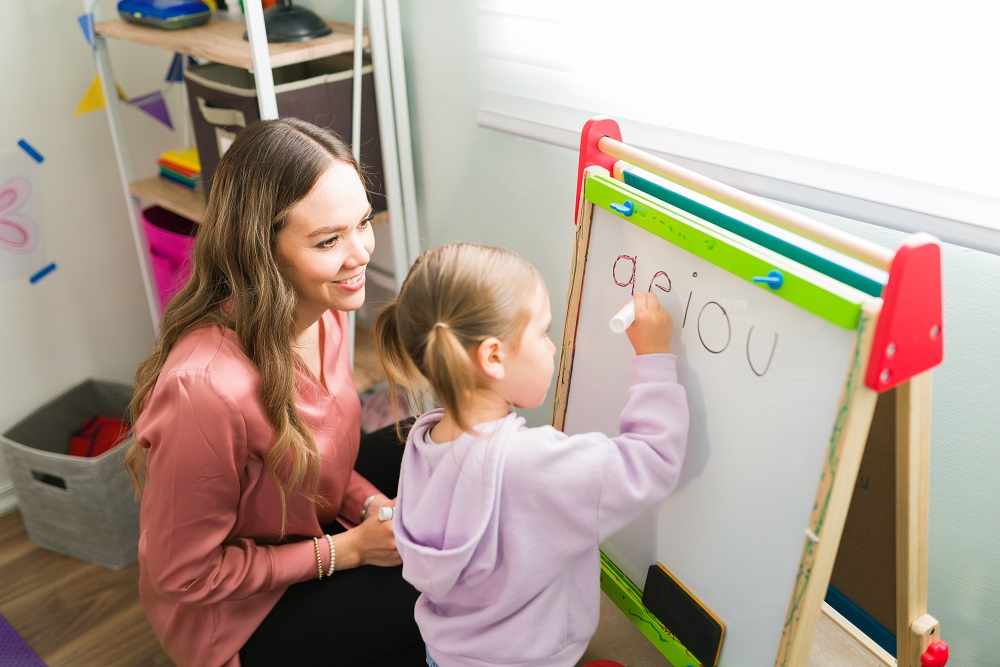Teaching vowels with spelling activities during school holidays

Learning vowels with spelling activities is an effective method of developing understanding!
- Are your kids hopeless with long and short vowels?
- Are you bored with teaching long and short vowels?
- Are your kids getting bored with lots of written exercises on the topic?
- Learning vowels with spelling activities is an effective method of developing understanding!
Unfortunately it is imperative that kids get this.
Here are some simple and fun activities that;
• your kids will love,
• get quick results,
• are cheap,
• won’t create a lot of work for you.
Kids have to hear the sounds in words;
• and know whether the vowels are making a long or short sound,
• this guides them in how to spell a word,
• this is what many spelling rules are based on.
This spelling activity can be played with;
• the whole class, in small groups or with a friend.
It is handy to do at;
• the start of the year,
• before your books arrive, or
• if children finish their Smart Words spelling activity early.
Junk Box Sort
You will need;
• Junk Box (container full of junk, objects, lost property, discarded toys),
• 3 hoops/containers,
• 3 labels (long vowels, short vowels, long and short vowel(s)).
How;
• Each child selects an item from the Junk Box,
• they decide if the vowel(s) in its name are long (eg bike) or short (eg cat) or both (eg kangaroo),
• The object is placed in the hoop/container with the appropriate label.
NB: There are often interesting discussions as children;
• call items different names or,
• argue their decisions.
- Extensions;
Categorise each of these piles;
• the short vowel pile could later be categorised into short vowel (/a/hat, /e/egg, /i/hit, /o/hot, /u/bus /oo/ pool, book, put) groups and the rest are long,
• the long vowel pile could later be categorised into long /a/, /e/, /i/, /o/, /u/ groups,
Repeat the activity with older students
• using magazines or newspapers,
• classify words instead of objects .
Other Junk Box Spelling Activity Ideas (K to Year 7):
– alphabetical order,
– sounding (lid is l-i-d),
– blending(l-i-d is lid),
– plurals (s or es or exceptions eg fish, sheep, teeth),
– comparatives and superlatives,
– compound words,
– visual memory,
– planning and writing a narrative….
Bonuses:
Once you get started the list is endless;
– The kids will start to develop their own games and activities,
– It is wonderful for imaginative play,
– It teaches sharing and co-operation amongst students,
– It is one of the most interactive teaching tools you will find for language and socialisation skills,
– It is fun,
– It rewards early finishes with worthwhile and related activities,
– It helps make our job as teachers easier and more successful,
– There is no marking.
Knowing how to spell a word is often dependent on initially identifying long and short vowel sounds in word.
This relies on;
– hearing,
– discriminating,
– remembering,
– rehearsal,
– chunking or syllabifying,
– associating,
– knowing the rules,
– knowing the letters to represent the sounds.
This can be done effectively through oral activities and the Junk Box is a great resource for spelling activities;
– We spell a word by writing it, but,
– In order to choose the right letters,
– We need to train our ears,
– To hear the sounds in a word,
– Our brain then searches for the letters that represent these sounds in the word.
These fun spelling activities help students to develop the listening skills to hear the sounds in a word so that by applying the appropriate rule(s) they are able to spell a word correctly.
Don’t forget to prepare for the upcoming year by purchasing SmartWords books at the shop!
For the month of January, Smart Achievers are doing a special $70 per hour tutoring offer. Don’t miss out, book via this link today!
